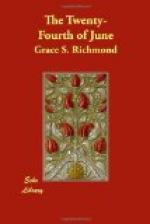“I have no reason to think otherwise, Rosy.”
She shook her head. “Somehow I—could never quite trust him. He would live strictly by the letter of the law—but the spirit—”
“Expect people to live by the spirit—these days, little girl?” inquired Louis, with an affectionate glance at her.
She gazed straight back. “Yes. You do it—and so does Stephen—and Father Gray—and Uncle Calvin.”
The eyes of the brothers met above her fair head, and they smiled.
“That’s high distinction, from you, dear,” said her husband. “But you must not do Westcott injustice. He has the reputation of being sharp as a knife blade, and of outwitting men in fair contest in court and out of it, but no shadow has ever touched his character.”
Still she shook her head. “I can’t help it. I don’t want Rob to marry him.”
The young men laughed together, and Rosamond smiled with them.
“There you have it,” said Louis. “There’s no going behind those returns. The county votes no, and the candidate is defeated. Let him console himself with the vote from other counties—if he can.”
The three were still upon the porch half an hour later, with others of the family, when the two figures came again up the stretch of lawn between the slim white birches, showing ghostlike now in the June moonlight. They came in silence, as far as any sound of their voices reached the porch, and they disappeared like two shades toward the front of the house.
“He’s not coming even to speak to us,” whispered Rosamond to Stephen. “That’s very unlike him. Do you suppose—”
“It may be a case of the voice sticking in the throat,” returned her husband, under his breath. “I fancy he’ll take it hard when Rob disposes of him—as she certainly ought to do by this time, if she’s not going to take him. But she’d better think twice. He’s a brilliant fellow, and he has no rivals within hailing distance, in his line.”
But Rosamond shook her head again. “He would never make her happy,” she breathed, with conviction. “Oh, I hope—I hope!”
Her hopes grew with Roberta’s absence. Westcott had gone, for Ruth, appearing at Rosamond’s side, announced that Roberta was in her own room, and would not be down again to-night.
“I think she has a headache,” said the little sister. “Queer, for I never knew Rob to have a headache before.”
“The headache,” murmured Louis, in Rosamond’s ear, “is the feminine defence against the world. A timely headache, now and then, is suffered by the best of men—and women. Well—let her rest, Rufus. She’ll be all right in the morning.”
Above them, by her open window, sat Roberta, for a little while, elbows on sill, chin in hands. Then, presently, she stole downstairs again, out by a side entrance, and away among the shrubbery, to the furthest point of the grounds—not far, in point of actual distance, but quite removed by its environment from contact with the world around. Here, stretched upon the warm turf, her arms outflung, her eyes gazing up at the star-set heavens above her, the girl rested from her encounter with a desperate besieging force.




